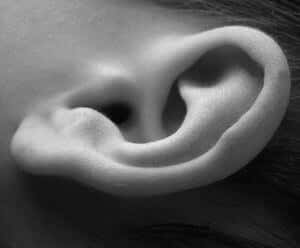
Is there anything more annoying than hearing a mosquito buzzing around your head and not being able to catch it? A dentist’s drill might be a close match. Now imagine what it would like to have crickets chirping in your ear 24 hours a day seven days a week.
Millions of people with tinnitus hear a constant noise in their ears. Some describe the sound as hissing, humming, chirping, squeaking or roaring. Many tinnitus victims talk about a high-pitched ringing. Others complain of radio static or an electronic whine.
The sounds never let up, but nobody else can hear them. People with tinnitus look normal, but the affliction can be as crippling as arthritis. Some people are so distressed by the sounds that they become severely depressed and contemplate suicide.
We heard from one wife:
My husband has a constant buzz in his ears and also hears a sound he likens to a dishwasher running. This particular sound bothers him most when he goes to bed or wakes up at night, and it wakes him frequently. The doctor says lots of people have tinnitus and the problem isn’t serious, but it has my husband on the ropes.
The cause of tinnitus remains somewhat mysterious. Traumatic noise, such as an explosion, can trigger life-long tinnitus as well as hearing loss.
Drugs can also bring on ringing in the ears. Aspirin and other anti-inflammatory drugs can cause it. So can some antibiotics and antidepressants.
In rare instances, tinnitus may signal a serious condition called acoustic neuroma. This tumor of the acoustic nerve should be ruled out with a test.
What can be done for tinnitus? More than ten years ago, investigators suggested that Xanax (alprazolam) could improve life for people with disabling tinnitus. We don’t know if this anti-anxiety drug actually affected the sound, or if it just helped them cope with it better. It has not been widely adopted as a treatment.
A new study suggests that a natural compound called melatonin may be helpful. This hormone is produced by the brain and is important for establishing the sleep cycle.
Researchers at Washington University found that patients taking 3 mg of melatonin one to two hours before bedtime both slept better and suffered less from their tinnitus (Otolaryngology-Head and Neck Surgery, Feb. 2006). An earlier melatonin study had found similar benefit (Laryngoscope, Mar. 1998).
One reader wrote that he found zinc citrate or zinc methionine supplements helpful. Research supported his observation that 50 mg of zinc daily may reduce tinnitus severity (Otology and Neurotology, Jan. 2003). A medication prescribed to protect the stomach from ulcers may also provide benefit for tinnitus sufferers. One small, controlled trial of Cytotec (misoprostol) found that it worked twice as well as placebo to relieve tinnitus loudness (Otolaryngology-Head and Neck Surgery, May 2004). Cytotec can cause diarrhea, abdominal pain, nausea and flatulence. It can also cause premature labor or miscarriage so pregnant women must avoid it.
Although a cure for tinnitus remains elusive, these measures may help some victims. People who don’t suffer this devastating condition should protect their precious hearing from loud noises and drugs that may do damage.

